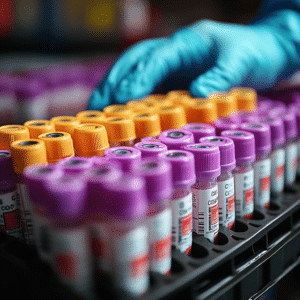Understanding bipolar depression can feel like you’re standing in the middle of a storm, with winds of doubt and despair swirling around. As parents, especially those of us who are grappling with a child’s addiction or loss, it’s vital to recognize the importance of mental health. One way to navigate the turbulent waters of bipolar disorder is through a bipolar depression test. These tests are more than just a checkmark; they can be powerful tools that guide individuals to a clearer understanding of their emotional landscape. Let’s unfold this banner for wellness together.
Understanding the Bipolar Depression Test
Bipolar disorder encompasses mood shifts swinging from high-energy mania to despairing lows of depression. The bipolar depression test helps put words to these experiences. By exploring the factors involved in this test, we can uncover how it fosters healing and growth. Here’s where we’ll relate to the struggles and strengths of families facing addiction, just as Brené Brown champions vulnerability and Elizabeth Vargas exemplifies resilience.
Engaging in a bipolar depression test shines a light on the complicated nature of this mental health issue. It doesn’t just categorize feelings; it invites conversations about them, laying the groundwork for improved emotional wellness. With a comprehensive understanding, you can pave the way for better mental health strategies—both for yourself and your child.

Top 7 Essential Aspects of the Bipolar Depression Test
Navigating a bipolar depression test involves several key components. Let’s unpack seven essential aspects that can change lives.
1. Standardized Screening Tools
Among the most widely used screening tools is the Mood Disorder Questionnaire (MDQ). This structured assessment isn’t just a checklist; it allows individuals to identify their symptoms and explore mood patterns. When used by professionals, it aids in crafting informed treatment strategies that resonate with the individual’s experiences.
2. Self-Assessment Questionnaires
Self-assessment options like the Beck Depression Inventory (BDI) play a significant role in understanding bipolar depression. Parents can encourage their children to complete these assessments, making it easier for everyone to articulate feelings. Recognizing depressive phases facilitates clearer communication with healthcare providers, giving voice to what so often feels unspoken.
3. The Role of Clinical Interviews
Nothing compares to a heart-to-heart conversation. Clinical interviews, particularly those using the Structured Clinical Interview for DSM-5 (SCID-5), enable mental health experts to delve deeper into mood states. The combination of qualitative and quantitative data creates a comprehensive picture that can guide therapeutic decisions.
4. Understanding Comorbidity with Other Disorders
It’s not just bipolar depression that can affect those struggling; many times anxiety and substance use disorders join the fray. Tools like the Achenbach System of Empirically Based Assessment (ASEBA) facilitate the identification of these overlapping conditions. This understanding broadens treatment approaches and enhances mental health strategies, central to families caught in the struggle with addiction.
5. Genetic and Neurobiological Insights
Groundbreaking research emphasizes the significance of genetic predispositions in bipolar disorder. Testing that incorporates genetic assessments, inspired by Psychiatric Genome Consortium guidelines, could reshape treatment plans tailored to each person’s unique genetic makeup. This innovation is crucial in refining the path to recovery, promising results that honor the individuality of each journey.
6. Impact of Lifestyle and Environmental Factors
Lifestyle choices can profoundly impact mood stabilization. The Healthy Lifestyle Inventory evaluates key factors like sleep, diet, and physical activity. Awareness of these elements encourages proactive engagement in mental health management, as families can support one another in fostering healthier routines.
7. Technology’s Role in Bipolar Depression Testing
With technological advancements, managing mental health has become more accessible. Apps such as Moodfit and Elevate allow individuals to track mood patterns and uncover their triggers. By collecting data that can be shared with health professionals, these tools create a feedback loop that enhances the bipolar depression test process, putting power back into the hands of those grappling with their mental health.

Embracing a Holistic Approach to Bipolar Depression
Taking a step back, the journey through bipolar depression blooms into something intricate yet manageable. The integration of standardized tools, self-assessments, and technology makes diagnosing and treating bipolar depression feel more feasible. This enriched approach not only facilitates understanding but also builds a bridge toward collaborative care.
Adopting a holistic viewpoint allows individuals to explore the nuances of their mental health with courage. By actively engaging with these testing methods, they embark on a journey characterized by discovery, resilience, and healing. Not only does it provide clarity, but it also opens new pathways for communication and empathy within families.
Ultimately, the bipolar depression test can serve as a life-altering tool. With its potential to guide families through the despair of addiction and loss, it sets the stage for deeper understanding. Together, we can promote a brighter future through awareness, support, and education. At Mothers Against addiction, we recognize that advocating for mental health is integral to supporting parents striving to connect with their children on their unique journeys.
Bipolar Depression Test: Fun Facts and Trivia
Understanding the Bipolar Depression Test
Did you know that a bipolar depression test isn’t just for those who feel sad? It’s also a tool for identifying different moods; think of it as a mood map. Just as a geographical layout helps us navigate the least populated state, this test guides those battling the ups and downs of bipolar disorder. It helps doctors spot early signs and tailor treatment plans, which can be life-changing for many. Speaking of change, music can also be uplifting. Taylor Swift And Traviss recent buzz remind us how important emotional expressions can be in our lives, serving as a reminder that everyone has their own series of peaks and valleys.
The Importance of Accurate Assessment
Getting the right diagnosis often feels like a game of chance. That’s why mental health professionals frequently recommend using various assessment tools, like the bipolar depression test. Think of it as your guide to navigating the rugged terrain of mental health. Just like using the Tor Project to uncover hidden layers online, these tests help uncover the deeper issues at play. Then there’s the human aspect—often, we search for definitions of words that help convey our feelings. For instance, to fully define meaning in our lives, understanding our mental health can provide invaluable insight into our self-perception.
A Little Humor Goes a Long Way
Did you know that laughter can be an effective temporary escape? Just like finding cheap Hotels in Brooklyn can make a trip more enjoyable, humor can lighten your mental load. So while you’re learning about bipolar depression tests, take a moment to chuckle at the absurdities of life—like Refrigerator Perry bringing joy to football fans. Laughter and light-heartedness can serve as a balm when you’re riding the waves of life’s challenges. While exploring these resources, don’t forget that seeking help, much like understanding dark web porn and its implications, requires vigilance and awareness.
Overall, engaging with a variety of sources and methods, including bipolar depression tests, can empower individuals and their families to rise above the clouds of depression. It’s all part of the journey—let’s navigate it together!





























